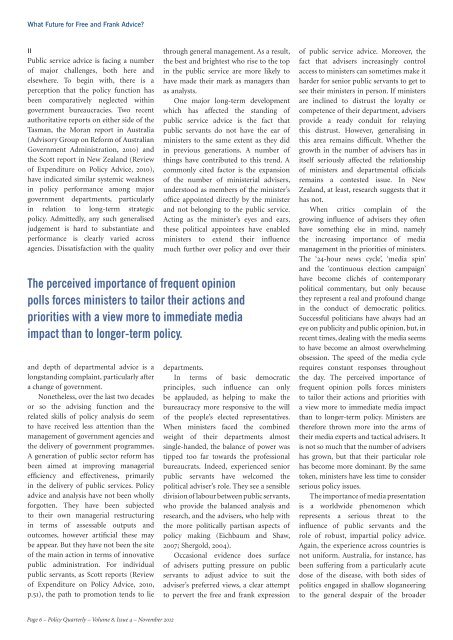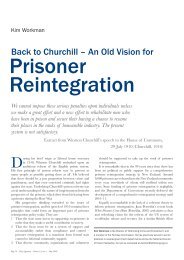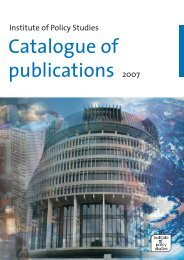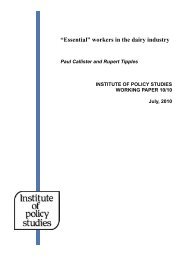PDF File - Institute for Governance and Policy Studies - Victoria ...
PDF File - Institute for Governance and Policy Studies - Victoria ...
PDF File - Institute for Governance and Policy Studies - Victoria ...
You also want an ePaper? Increase the reach of your titles
YUMPU automatically turns print PDFs into web optimized ePapers that Google loves.
What Future <strong>for</strong> Free <strong>and</strong> Frank Advice<br />
II<br />
Public service advice is facing a number<br />
of major challenges, both here <strong>and</strong><br />
elsewhere. To begin with, there is a<br />
perception that the policy function has<br />
been comparatively neglected within<br />
government bureaucracies. Two recent<br />
authoritative reports on either side of the<br />
Tasman, the Moran report in Australia<br />
(Advisory Group on Re<strong>for</strong>m of Australian<br />
Government Administration, 2010) <strong>and</strong><br />
the Scott report in New Zeal<strong>and</strong> (Review<br />
of Expenditure on <strong>Policy</strong> Advice, 2010),<br />
have indicated similar systemic weakness<br />
in policy per<strong>for</strong>mance among major<br />
government departments, particularly<br />
in relation to long-term strategic<br />
policy. Admittedly, any such generalised<br />
judgement is hard to substantiate <strong>and</strong><br />
per<strong>for</strong>mance is clearly varied across<br />
agencies. Dissatisfaction with the quality<br />
<strong>and</strong> depth of departmental advice is a<br />
longst<strong>and</strong>ing complaint, particularly after<br />
a change of government.<br />
Nonetheless, over the last two decades<br />
or so the advising function <strong>and</strong> the<br />
related skills of policy analysis do seem<br />
to have received less attention than the<br />
management of government agencies <strong>and</strong><br />
the delivery of government programmes.<br />
A generation of public sector re<strong>for</strong>m has<br />
been aimed at improving managerial<br />
efficiency <strong>and</strong> effectiveness, primarily<br />
in the delivery of public services. <strong>Policy</strong><br />
advice <strong>and</strong> analysis have not been wholly<br />
<strong>for</strong>gotten. They have been subjected<br />
to their own managerial restructuring<br />
in terms of assessable outputs <strong>and</strong><br />
outcomes, however artificial these may<br />
be appear. But they have not been the site<br />
of the main action in terms of innovative<br />
public administration. For individual<br />
public servants, as Scott reports (Review<br />
of Expenditure on <strong>Policy</strong> Advice, 2010,<br />
p.51), the path to promotion tends to lie<br />
through general management. As a result,<br />
the best <strong>and</strong> brightest who rise to the top<br />
in the public service are more likely to<br />
have made their mark as managers than<br />
as analysts.<br />
One major long-term development<br />
which has affected the st<strong>and</strong>ing of<br />
public service advice is the fact that<br />
public servants do not have the ear of<br />
ministers to the same extent as they did<br />
in previous generations. A number of<br />
things have contributed to this trend. A<br />
commonly cited factor is the expansion<br />
of the number of ministerial advisers,<br />
understood as members of the minister’s<br />
office appointed directly by the minister<br />
<strong>and</strong> not belonging to the public service.<br />
Acting as the minister’s eyes <strong>and</strong> ears,<br />
these political appointees have enabled<br />
ministers to extend their influence<br />
much further over policy <strong>and</strong> over their<br />
The perceived importance of frequent opinion<br />
polls <strong>for</strong>ces ministers to tailor their actions <strong>and</strong><br />
priorities with a view more to immediate media<br />
impact than to longer-term policy.<br />
departments.<br />
In terms of basic democratic<br />
principles, such influence can only<br />
be applauded, as helping to make the<br />
bureaucracy more responsive to the will<br />
of the people’s elected representatives.<br />
When ministers faced the combined<br />
weight of their departments almost<br />
single-h<strong>and</strong>ed, the balance of power was<br />
tipped too far towards the professional<br />
bureaucrats. Indeed, experienced senior<br />
public servants have welcomed the<br />
political adviser’s role. They see a sensible<br />
division of labour between public servants,<br />
who provide the balanced analysis <strong>and</strong><br />
research, <strong>and</strong> the advisers, who help with<br />
the more politically partisan aspects of<br />
policy making (Eichbaum <strong>and</strong> Shaw,<br />
2007; Shergold, 2004).<br />
Occasional evidence does surface<br />
of advisers putting pressure on public<br />
servants to adjust advice to suit the<br />
adviser’s preferred views, a clear attempt<br />
to pervert the free <strong>and</strong> frank expression<br />
of public service advice. Moreover, the<br />
fact that advisers increasingly control<br />
access to ministers can sometimes make it<br />
harder <strong>for</strong> senior public servants to get to<br />
see their ministers in person. If ministers<br />
are inclined to distrust the loyalty or<br />
competence of their department, advisers<br />
provide a ready conduit <strong>for</strong> relaying<br />
this distrust. However, generalising in<br />
this area remains difficult. Whether the<br />
growth in the number of advisers has in<br />
itself seriously affected the relationship<br />
of ministers <strong>and</strong> departmental officials<br />
remains a contested issue. In New<br />
Zeal<strong>and</strong>, at least, research suggests that it<br />
has not.<br />
When critics complain of the<br />
growing influence of advisers they often<br />
have something else in mind, namely<br />
the increasing importance of media<br />
management in the priorities of ministers.<br />
The ‘24-hour news cycle’, ‘media spin’<br />
<strong>and</strong> the ‘continuous election campaign’<br />
have become clichés of contemporary<br />
political commentary, but only because<br />
they represent a real <strong>and</strong> profound change<br />
in the conduct of democratic politics.<br />
Successful politicians have always had an<br />
eye on publicity <strong>and</strong> public opinion, but, in<br />
recent times, dealing with the media seems<br />
to have become an almost overwhelming<br />
obsession. The speed of the media cycle<br />
requires constant responses throughout<br />
the day. The perceived importance of<br />
frequent opinion polls <strong>for</strong>ces ministers<br />
to tailor their actions <strong>and</strong> priorities with<br />
a view more to immediate media impact<br />
than to longer-term policy. Ministers are<br />
there<strong>for</strong>e thrown more into the arms of<br />
their media experts <strong>and</strong> tactical advisers. It<br />
is not so much that the number of advisers<br />
has grown, but that their particular role<br />
has become more dominant. By the same<br />
token, ministers have less time to consider<br />
serious policy issues.<br />
The importance of media presentation<br />
is a worldwide phenomenon which<br />
represents a serious threat to the<br />
influence of public servants <strong>and</strong> the<br />
role of robust, impartial policy advice.<br />
Again, the experience across countries is<br />
not uni<strong>for</strong>m. Australia, <strong>for</strong> instance, has<br />
been suffering from a particularly acute<br />
dose of the disease, with both sides of<br />
politics engaged in shallow sloganeering<br />
to the general despair of the broader<br />
Page 6 – <strong>Policy</strong> Quarterly – Volume 8, Issue 4 – November 2012













